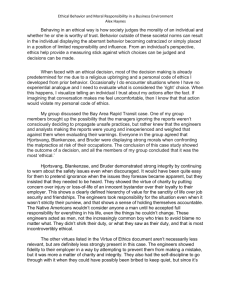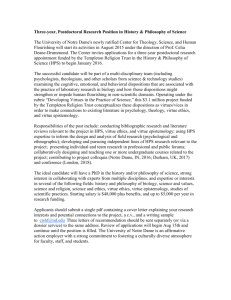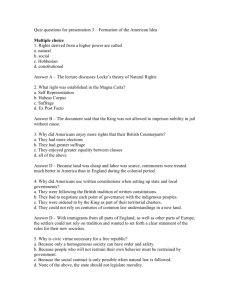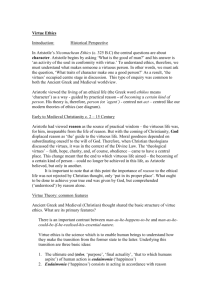W04-1 (Jn6) Aristotle: Virtue Ethics
advertisement
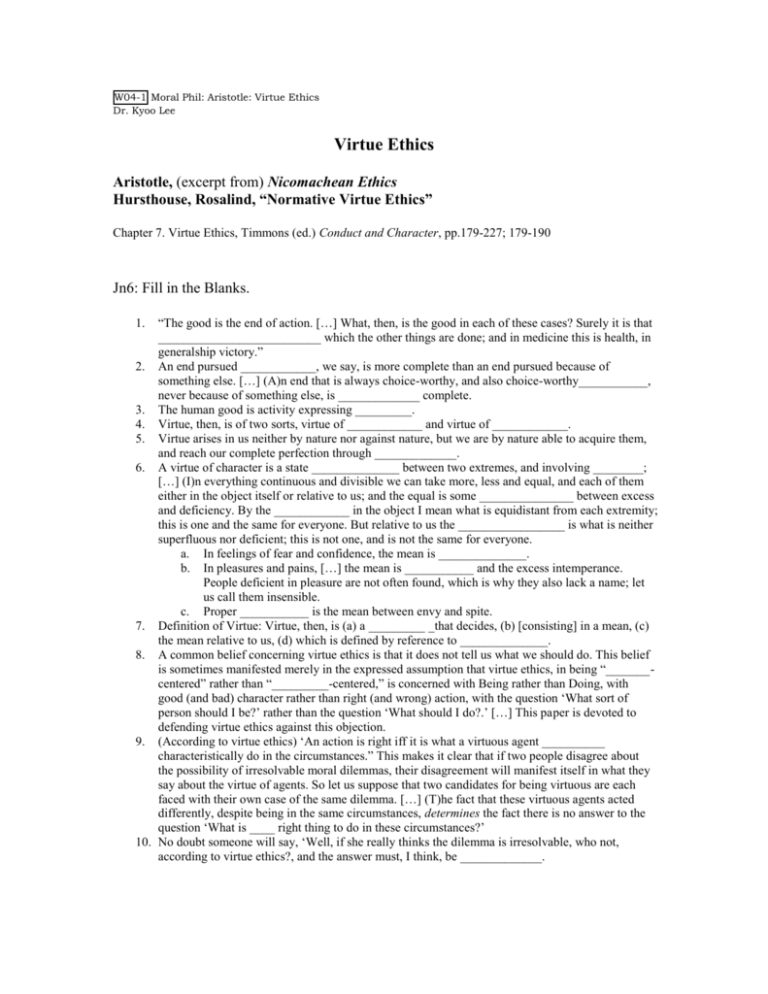
W04-1 Moral Phil: Aristotle: Virtue Ethics Dr. Kyoo Lee Virtue Ethics Aristotle, (excerpt from) Nicomachean Ethics Hursthouse, Rosalind, “Normative Virtue Ethics” Chapter 7. Virtue Ethics, Timmons (ed.) Conduct and Character, pp.179-227; 179-190 Jn6: Fill in the Blanks. “The good is the end of action. […] What, then, is the good in each of these cases? Surely it is that __________________________ which the other things are done; and in medicine this is health, in generalship victory.” 2. An end pursued ____________, we say, is more complete than an end pursued because of something else. […] (A)n end that is always choice-worthy, and also choice-worthy___________, never because of something else, is _____________ complete. 3. The human good is activity expressing _________. 4. Virtue, then, is of two sorts, virtue of ____________ and virtue of ____________. 5. Virtue arises in us neither by nature nor against nature, but we are by nature able to acquire them, and reach our complete perfection through _____________. 6. A virtue of character is a state ______________ between two extremes, and involving ________; […] (I)n everything continuous and divisible we can take more, less and equal, and each of them either in the object itself or relative to us; and the equal is some _______________ between excess and deficiency. By the ____________ in the object I mean what is equidistant from each extremity; this is one and the same for everyone. But relative to us the _________________ is what is neither superfluous nor deficient; this is not one, and is not the same for everyone. a. In feelings of fear and confidence, the mean is ______________. b. In pleasures and pains, […] the mean is ___________ and the excess intemperance. People deficient in pleasure are not often found, which is why they also lack a name; let us call them insensible. c. Proper ___________ is the mean between envy and spite. 7. Definition of Virtue: Virtue, then, is (a) a _________ _that decides, (b) [consisting] in a mean, (c) the mean relative to us, (d) which is defined by reference to ______________. 8. A common belief concerning virtue ethics is that it does not tell us what we should do. This belief is sometimes manifested merely in the expressed assumption that virtue ethics, in being “_______centered” rather than “_________-centered,” is concerned with Being rather than Doing, with good (and bad) character rather than right (and wrong) action, with the question ‘What sort of person should I be?’ rather than the question ‘What should I do?.’ […] This paper is devoted to defending virtue ethics against this objection. 9. (According to virtue ethics) ‘An action is right iff it is what a virtuous agent __________ characteristically do in the circumstances.” This makes it clear that if two people disagree about the possibility of irresolvable moral dilemmas, their disagreement will manifest itself in what they say about the virtue of agents. So let us suppose that two candidates for being virtuous are each faced with their own case of the same dilemma. […] (T)he fact that these virtuous agents acted differently, despite being in the same circumstances, determines the fact there is no answer to the question ‘What is ____ right thing to do in these circumstances?’ 10. No doubt someone will say, ‘Well, if she really thinks the dilemma is irresolvable, who not, according to virtue ethics?, and the answer must, I think, be _____________. 1.






